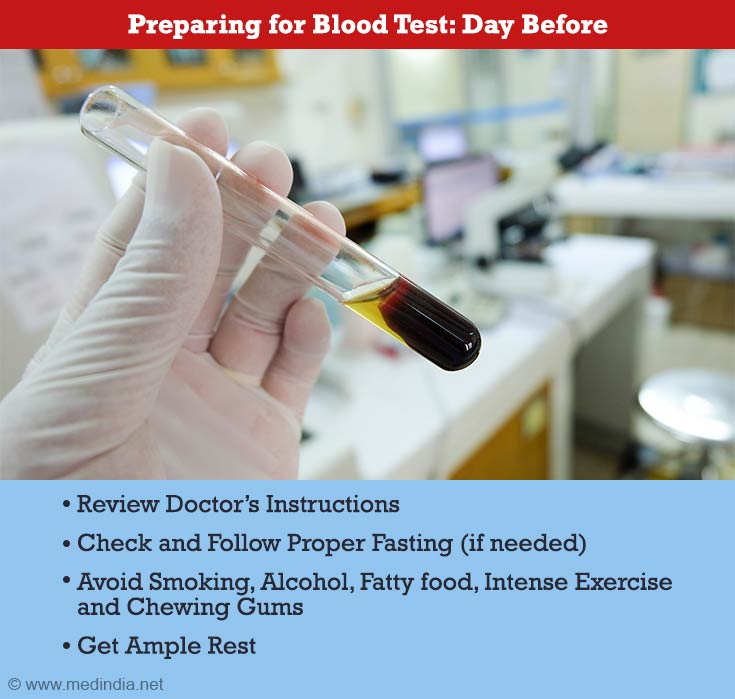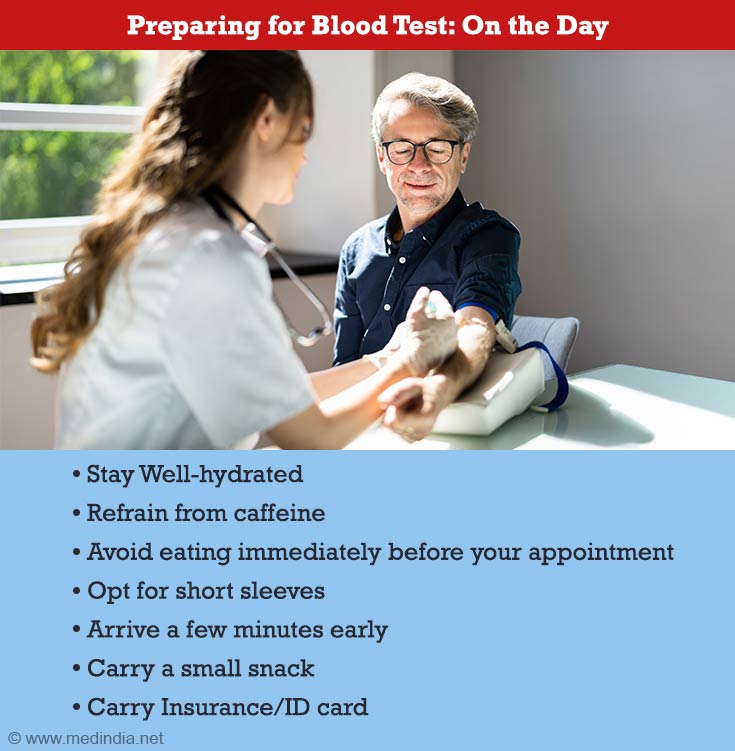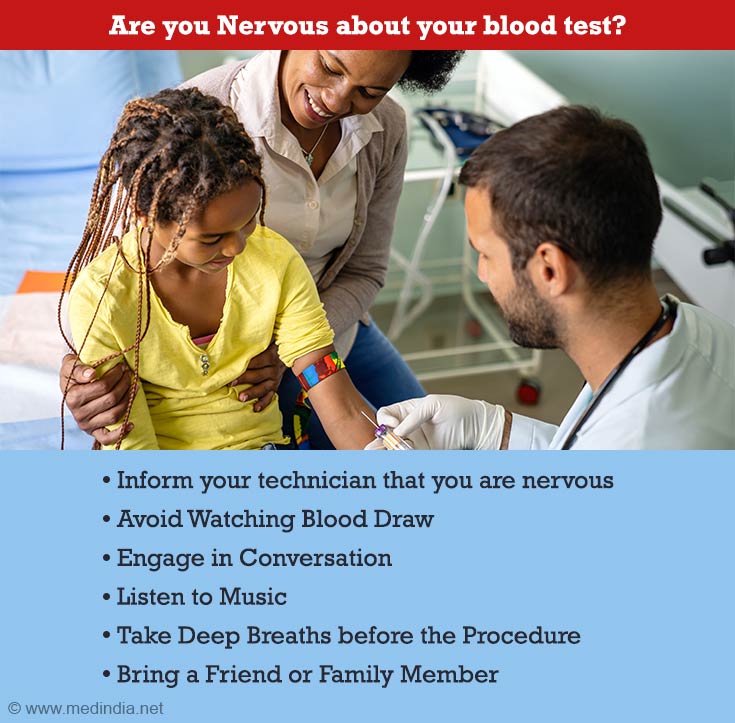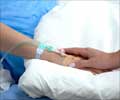- How to Prepare to Have Your Blood Drawn - (https://www.northbay.org/blog/your-wellness/2019/how-to-prepare-to-have-your-blood-drawn.cfm)
- Fasting for a Blood Test - (https://medlineplus.gov/lab-tests/fasting-for-a-blood-test/)
About
Adhering to your doctor's instructions stands as the foremost step in preparing for a blood test. Additionally, ensuring a good night's sleep, maintaining adequate hydration, and abstaining from certain foods and beverages can also yield benefits.
While blood tests are a routine procedure, some individuals may experience apprehension about the blood-drawing process. Others might be uncertain about the necessary preparations, including whether to refrain from eating or drinking prior to the test.
This guide helps you get ready for a blood test and know what to expect when getting your blood drawn. Following your healthcare provider's instructions and these preparatory steps will contribute to a smooth and successful blood test experience.
When preparing for a blood test, it's important to understand the different types of blood tests that may be performed. One common test is the Complete Blood Count (CBC), which examines various components of your blood, including red blood cells, white blood cells, and platelets. Another crucial assessment is the Basic Metabolic Panel, which evaluates essential chemicals in your blood like glucose, electrolytes, and proteins.
Before the test, it's normal to feel some apprehension about the procedure and the potential blood test results. It's worth noting that only a small amount of blood is needed for most tests. The healthcare professional will carefully insert the needle into a vein, typically in your arm, to draw blood. This process is relatively quick and is done to analyze different parts of your blood, providing valuable insights into your health( 1✔ ✔Trusted Source
How to Prepare to Have Your Blood Drawn
Go to source) .
Preparing for Your Blood Test: The Day Before
On the day preceding your blood test, observe the following preparation tips:
- Thoroughly review your doctor's instructions.
- Some blood tests require fasting for 10-12 hours beforehand, which means not eating or drinking anything except water. Your doctor may also advise discontinuing certain prescription medications.
- To fast, avoid smoking, drinking alcohol, chewing gum, and doing intense exercise. These activities can affect blood test results(2✔ ✔Trusted Source
Fasting for a Blood Test
Go to source).Blood Tests That Typically Require Fasting
: Your doctor will inform you if fasting is necessary prior to your blood test. Blood tests that commonly necessitate fasting encompass - Liver function tests
- Cholesterol tests (lipid panels)
- Triglyceride level tests
- Blood glucose tests
- High-density lipoprotein (HDL) and low-density lipoprotein (LDL) tests
- Metabolic panel tests
- If fasting is not necessary, abstain from alcohol and refrain from indulging in rich or fatty foods. This ensures you feel your best on the day of the appointment.
- Ensure you get ample rest. Being well-rested facilitates smoother access to your veins during the blood draw.
Before going to a lab without appointment requirements, call ahead to find out the least busy times to avoid long waits.

Preparing for Your Test on the Day of it
On the actual day of your blood test, adhere to these preparation suggestions:
- Stay well-hydrated by consuming plenty of water. This helps maintain adequate fluid levels in your veins, facilitating an easier blood draw.
- Refrain from coffee and other caffeinated beverages, as they may lead to dehydration
- If fasting is not required, have breakfast 1–2 hours prior to the test. This can help prevent lightheadedness during the blood draw.
- If you're concerned about potential queasiness or nausea, avoid eating immediately before your appointment.
- Opt for short sleeves beneath any outerwear to streamline access to your arm.
- Arrive a few minutes early to allow time for filling out any necessary paperwork.
- Bring your insurance card and a form of identification.
- Carry a small snack, like a piece of fruit or a protein bar, for after your appointment.

What to Expect During a Blood Draw
A blood draw is typically a brief procedure, usually taking just a few minutes.
- Upon arrival at the lab, you'll check in for your appointmentat the front desk. You'll wait in the lobby until a technician invites you into the blood draw room. There, the technician will have you sit in a chair with an armrest.
- If you're wearing a long-sleeved shirt, you'll roll up your sleeve past your elbow and extend your arm forward.
Preparation of the Blood Test Site
:The technician will cleanse a small area on your arm with an antiseptic wipe. They'll also secure an elastic band around your arm, causing your vein to swell and making it easier to insert the needle for blood collection.- To promote blood flow, the technician may ask you to make a fist. They'll then gently insert a needle into your arm. You may feel a slight pricking sensation, but it should not be painful.
- After enough blood is taken, the technician will take out the needle and cover the hole with a small bandage.
- Inform your technician if you experience any dizziness after the blood draw. You can remain in the chair until the sensation passes.
- If you've brought a snack and water, this is a suitable time to consume them. If you haven't brought any food or water, you can ask the technician for a cup of water. Drinking water can help alleviate any dizziness you may be experiencing.
- You might experience minor soreness or a small bruiseat the site where the needle was inserted. Any discomfort should subside within a few days.
Coping with Nervousness
- Inform the technician if you're feeling nervous. They can assist in making you feel more at ease and may discuss options such as lying down instead of sitting.
- Avoid watching the blood draw. Choose an object or another spot in the room to focus on.
- Engage in conversation with the technician to help divert your attention during the procedure.
- Listen to music using earbuds or headphones.
- Take a few deep breaths before and during the procedure. Concentrate on each breath in and out to divert your mind from the procedure.
- Bring a friend or family member for support and comfort.

Conclusion
In conclusion, while the thought of a blood test may be intimidating, it's crucial to remember that they are essential tools in maintaining good health.
Familiarizing yourself with the types of blood tests and what they measure can help alleviate any concerns you may have.
The CBC, for instance, helps gauge your overall blood health, including the presence of any abnormalities or irregularities in white blood cell counts, which can indicate potential issues with your immune system. Additionally, it checks for any blood clotting disorders, which are vital indicators for cardiovascular health and may suggest a risk of heart disease.
Understanding how these kinds of blood tests function can provide reassurance. Enzyme tests, for instance, can reveal specific markers related to heart function. These markers assess how well blood flows through your heart and whether there may be any cardiac concerns.
Disclaimer: Always consult with your healthcare provider for a thorough explanation of your blood test results and any necessary follow-up actions.










